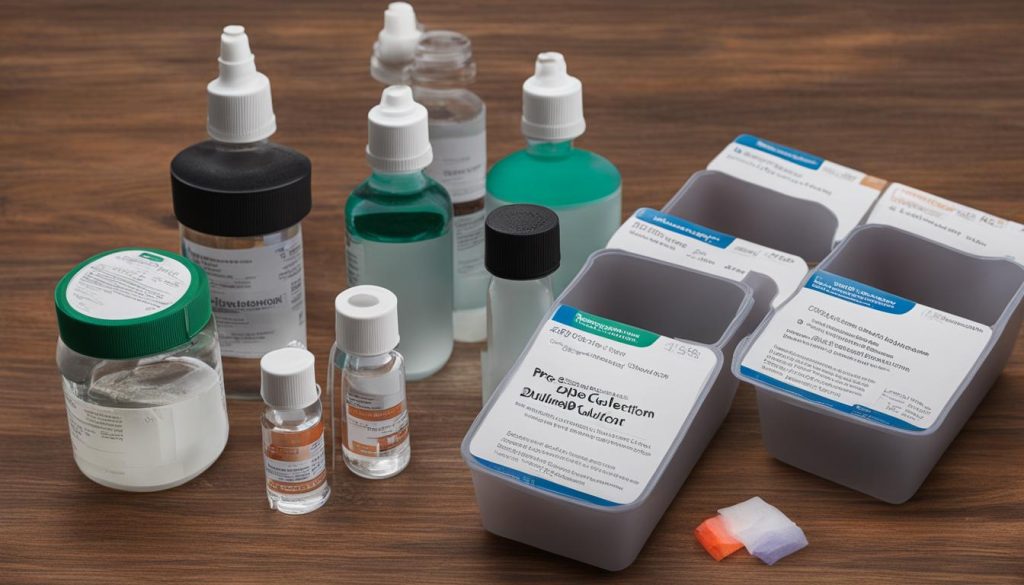
Welcome to our comprehensive guide on assessing sample dilution techniques for drug tests. In this article, we will delve into the various methods individuals employ to dilute their urine samples in an attempt to cheat drug tests. We will explore the effectiveness of these techniques and shed light on the consequences that can arise from using diluted samples.
Key Takeaways:
- Sample dilution is a common method used to try to pass drug tests.
- Drinking large volumes of water or non-toxic liquids can dilute urine samples.
- Dilution is not effective for alcohol tests.
- Various substances and products claiming to help beat drug tests have questionable effectiveness.
- Specimen validity testing can detect dilution, adulteration, and substitution in urine samples.
Types of Adulteration and Sample Tampering
When it comes to cheating on drug tests, individuals may employ various methods of adulteration and sample tampering. These techniques aim to alter the composition of the urine sample in order to produce false negative results. Here are the three common methods individuals may resort to:
- External Adulteration: This method involves adding substances to the urine sample after it has been voided. Common adulterants include household items such as bleach, vinegar, or eye drops, which can mask the presence of drugs or dilute their concentration.
- Internal Adulteration: In this method, individuals ingest substances that either dilute the drugs or inhibit their detection. Some examples of internal adulterants include diuretics, such as coffee or cranberry juice, which increase urine production and lower drug concentration.
- Urine Substitution: This method entails using someone else’s clean urine in place of one’s own. The substitute urine is typically stored in a container and surreptitiously swapped with the individual’s own sample during the testing process.
These methods of adulteration and tampering pose significant challenges for drug testing programs. Not only do they undermine the accuracy and integrity of the results, but they also make it difficult to identify individuals who may have drug-related issues that require intervention and support.
Pre-Collection and Post-Collection Dilution Methods
When it comes to attempting to manipulate drug test results, individuals may employ various pre-collection and post-collection dilution methods. These techniques aim to decrease the concentration of drugs in the urine sample, thereby increasing the chances of obtaining a negative result. Let’s take a closer look at the different strategies individuals may employ:
Pre-Collection Dilution Methods
Pre-collection dilution methods involve altering the urine sample before it is collected for testing. Some common techniques include:
- Hydration: Drinking large amounts of water in an effort to dilute the urine. This method seeks to increase urine volume and reduce drug concentration.
- Water-Loading: Similar to hydration, this technique involves consuming excessive amounts of water leading up to the test.
- Diuretics: The use of diuretic substances, such as herbal supplements or prescription medications, to increase urine production and dilute the concentration of drugs.
Post-Collection Dilution Methods
If an individual is unable to dilute the urine sample before collection, they may resort to post-collection dilution methods. These techniques involve manipulating the sample after it has been provided. Some common post-collection dilution methods include:
- Adding Water: Adding water from a sink or toilet to the provided urine sample to decrease the concentration of drugs.
- Diluting Agents: Using commercially available products or household substances that claim to dilute the urine and lower drug concentrations.
- Other Techniques: Various other methods may be employed, such as substituting the provided urine with someone else’s clean sample.
It is important to note that laboratories have become increasingly sophisticated in detecting both pre- and post-collection dilution methods. Specimen validity checks, which measure certain parameters like creatinine levels and specific gravity, can identify diluted samples. Labs implementing these checks can distinguish between natural and intentional dilution, ensuring the integrity of drug test results.
| Dilution Method | Description |
|---|---|
| Hydration | Drinking excessive amounts of water to dilute urine before collection. |
| Water-Loading | Consuming excessive amounts of water leading up to the test. |
| Diuretics | Using diuretic substances to increase urine production and dilute drug concentrations. |
| Adding Water | Pouring water from a sink or toilet into the urine sample after collection. |
| Diluting Agents | Using products or substances to dilute the urine and lower drug concentrations. |
| Substitution | Replacing the provided urine sample with someone else’s clean urine. |

While individuals may attempt to manipulate drug test results through pre-collection and post-collection dilution methods, it is crucial to remember that laboratories are constantly evolving to detect these tactics. Specimen validity testing and other advanced techniques are employed to ensure the accuracy and reliability of drug test results, protecting the integrity of the testing process.
Specimen Validity Testing for Diluted Samples
At our laboratory, we employ specimen validity testing to ensure accurate and reliable results for drug tests. Specimen validity testing allows us to detect and identify potential dilution, adulteration, and substitution in urine samples. By analyzing various parameters, including temperature, specific gravity, pH, and creatinine levels, we can assess the integrity of the sample and determine the presence of any potential tampering.
One of the key indicators of a diluted sample is the specific gravity. Specific gravity measures the concentration of solutes in the urine and can give insight into whether the sample has been excessively diluted. Low specific gravity values may suggest the addition of water or other substances to the urine, which can lower the concentration of drugs or metabolites. Our laboratory utilizes established ranges for specific gravity to identify potential dilution attempts.
Creatinine level is another important parameter we assess during specimen validity testing. Creatinine is a waste product of muscle metabolism and is naturally present in urine. In a diluted sample, the creatinine level may be abnormally low, indicating a potential attempt at dilution. By comparing the creatinine level to established thresholds, we can determine if the sample is dilute and take appropriate actions.
| Parameter | Normal Range | Indicative of Dilution |
|---|---|---|
| Specific Gravity | 1.005 – 1.030 | Below 1.005 or above 1.030 |
| Creatinine Level | 20 – 320 mg/dL | Below 20 mg/dL |
By conducting thorough specimen validity testing, we can confidently identify and flag diluted samples, ensuring the integrity of the drug testing process. Our protocols are designed to provide accurate and reliable results, helping organizations make informed decisions regarding employee drug usage and maintaining a safe work environment.
Factors Influencing Diluted Sample Test Results
When it comes to drug tests, the outcome of a diluted sample can be influenced by various factors. Individual variation plays a significant role in determining the concentration of drugs in urine. Factors such as metabolism, kidney function, and the amount of water consumed can all affect the drug levels detected in a sample. It’s important to note that even though dilution may lower the drug concentration, it doesn’t guarantee a negative test result.
Another factor to consider is the use of diuretics. Diuretics are medications that increase urination and, as a result, can contribute to higher urine water content. While some individuals may believe that diuretics can help them pass a drug test by diluting their urine, this is not always the case. Laboratories are aware of this technique and have measures in place to detect dilution attempts.
To better understand the factors influencing diluted sample test results, let’s take a closer look at individual variation and the impact of diuretics on drug tests:
Individual Variation
Every person is unique, and this extends to how their bodies process and eliminate drugs. Metabolism, kidney function, and fluid intake can vary from person to person, leading to differences in the concentration of drugs in urine. This variation can make it difficult to predict how dilution will affect the outcome of a drug test.
Diuretics
Diuretics, such as caffeine, can increase urine production and water content. Some individuals may mistakenly believe that consuming large amounts of diuretic-containing substances, like coffee or certain herbal teas, will dilute their urine enough to pass a drug test. However, laboratories are equipped to detect abnormal levels of dilution and can take further steps to confirm the presence of drugs in the sample.

| Factors Influencing Diluted Sample Test Results |
|---|
| Individual Variation |
| Metabolism |
| Kidney Function |
| Fluid Intake |
| Diuretics |
| Caffeine |
| Lab Detection of Dilution |
In conclusion, the outcome of a diluted sample test can be influenced by factors such as individual variation and the use of diuretics. While dilution may lower the concentration of drugs in urine, it does not guarantee a negative test result. Laboratories are equipped to detect abnormal levels of dilution and can take further steps to confirm the presence of drugs in a sample. It’s important for individuals to be aware of these factors and understand that attempting to cheat on a drug test is highly unlikely to result in a negative outcome.
Difficulty of Cheating on Drug Tests
When it comes to cheating on drug tests, many people believe they have foolproof methods to beat the system. However, the reality is that cheating on drug tests is not as easy as it may seem. Numerous commonly suggested methods have been debunked, and drug testing laboratories have become more sophisticated in detecting adulteration and dilution attempts.
One of the most commonly suggested methods is drinking excessive amounts of water before a drug test. However, this method has been proven ineffective. While it may result in a positive dilute test result, it does not guarantee a negative result. Laboratories conduct specimen validity testing, which can detect dilution and reveal abnormal levels of specific gravity and creatinine in urine samples.
Exercise and fasting are also often recommended as ways to prevent drug detection. However, these methods do not effectively mask the presence of drugs in urine. Additionally, relying on second-hand smoke as an excuse for a positive drug test is not valid, as the levels of drugs in second-hand smoke are typically too low to result in a positive test.
It is essential to understand that drug tests have become more advanced in recent years, and laboratories now have the ability to detect adulteration, dilution, and substitution attempts. Furthermore, false positives can occur due to the lack of specificity in immunoassay tests. Therefore, cheating on a drug test is highly unlikely to result in a negative outcome.
Positive Dilute Test Results and Consequences
A positive dilute test result occurs when a urine sample is found to be diluted but still contains enough drug metabolites to produce a positive test. It is important to note that the dilution of the sample does not negate the positive result. The presence of drug metabolites in a diluted sample indicates recent drug use and can have serious consequences.
When a sample is deemed dilute and positive, employers may request additional testing to confirm the presence of drugs. This can include more sensitive testing methods such as gas chromatography-mass spectrometry (GC-MS) to accurately identify the specific drugs and their concentrations in the sample. The consequences for a positive dilute test result are typically the same as those for a positive test result, which may include disciplinary actions such as probation, loss of employment, or legal repercussions depending on the context.
It is worth noting that some organizations have specific policies in place to address dilute test results. For example, SureHire, an expert in occupational testing, utilizes urine specimen collection and dilution protocols to address potential dilution attempts. Rapid specimen validity tests are conducted to detect creatinine and specific gravity levels within urine samples. If a sample is found to be dilute, the participant is given a specified time frame to provide an acceptable specimen before additional testing is required.
Table: Consequences of Positive Dilute Test Results
| Consequence | Description |
|---|---|
| Probation | The individual may be placed on probation, which can include regular drug testing, mandatory counseling, or other conditions. |
| Loss of Employment | Employers may terminate the individual’s employment based on a positive dilute test result, especially in safety-sensitive positions or where drug use is strictly prohibited. |
| Legal Repercussions | Depending on the circumstances, positive dilute test results could result in legal consequences, such as fines or imprisonment, particularly in situations involving driving under the influence or drug-related offenses. |
It is crucial for individuals to understand that attempting to cheat on drug tests through sample dilution or adulteration is unlikely to yield favorable outcomes. The consequences of a positive dilute test result can have far-reaching implications, affecting employment prospects and legal standing. Employers and testing agencies continue to implement measures, such as specimen validity testing, to detect and deter dilution attempts, ensuring the accuracy and integrity of drug test results.
Myths and Misinformation about Beating Drug Tests
When it comes to beating drug tests, there are countless myths and misinformation floating around. Many people believe that certain tactics, such as consuming excessive amounts of water or engaging in vigorous exercise, can help them pass a drug test. However, it is important to separate fact from fiction to understand the true effectiveness of these methods.
Water Consumption: One common myth is that drinking large quantities of water before a drug test will dilute the urine and lower the concentration of drugs, resulting in a negative test result. While drinking water can indeed dilute the urine, it does not guarantee a negative test. In fact, dilution is often detected during specimen validity testing, leading to further scrutiny of the sample.
Exercise: Another myth is that intense physical exercise can help rid the body of drug metabolites, making them undetectable in a drug test. However, this is not the case. While exercise does increase metabolism and the excretion of waste products, drug metabolites are stored in body tissues and can be detected in urine for a certain period of time, regardless of physical activity.
Antibiotics: Some people believe that taking antibiotics before a drug test can help mask the presence of drugs in the urine. While certain antibiotics may temporarily increase opiate levels, confirmation tests can identify the presence of antibiotics and distinguish them from actual drug metabolites.
It is essential to debunk these myths and understand that cheating on a drug test is highly unlikely to result in a negative outcome. Laboratories have become more sophisticated in detecting adulteration, dilution, and substitution in urine samples. Moreover, false positives can occur due to the lack of specificity in immunoassay tests, which can lead to additional confirmatory testing and potential consequences for individuals trying to beat the system.

SureHire’s Urine Specimen Collection & Dilution Protocols
At SureHire, we pride ourselves on our expertise in occupational testing and our commitment to ensuring accurate and reliable results. To address potential dilution attempts, we have implemented robust urine specimen collection and dilution protocols.
As part of our protocols, we conduct rapid specimen validity tests to detect any irregularities in urine samples. These tests specifically measure creatinine and specific gravity levels within the urine, providing us with valuable information about sample dilution.
In the event that a dilute sample is identified, we provide participants with a specified time frame to provide an acceptable specimen. This allows individuals the opportunity to provide a new sample within the required parameters, without the need for additional testing.
Through our meticulous urine specimen collection and dilution protocols, we ensure the integrity of the testing process and provide our clients with reliable and accurate results. Trust SureHire for all your occupational testing needs.
FAQ
What is sample dilution in drug tests?
Sample dilution is a method used to try to pass drug tests by increasing urine volume and lowering the concentration of drugs in the sample.
Does sample dilution work for alcohol tests?
No, sample dilution is not effective for alcohol tests.
What are the different methods of cheating on a drug test?
The three main methods of cheating on a drug test are external adulteration, internal adulteration, and urine substitution.
What is external adulteration?
External adulteration involves adding substances to the urine sample after voiding.
What is internal adulteration?
Internal adulteration is achieved by ingesting substances that dilute or mask the presence of drugs.
What is urine substitution?
Urine substitution involves using someone else’s clean urine in place of one’s own.
When can sample dilution occur?
Sample dilution can occur before or after the collection of a urine sample.
What are pre-collection dilution methods?
Pre-collection dilution methods include hydration, water-loading, and the use of diuretics.
What are post-collection dilution methods?
Post-collection dilution methods involve adding water from a sink or toilet or using diluting agents to lower the drug concentration in the urine.
How do laboratories detect dilution and adulteration?
Laboratories use specimen validity testing to detect dilution, adulteration, and substitution in urine samples.
What tests are conducted during specimen validity testing?
Specimen validity testing includes measuring the temperature, specific gravity, pH, and creatinine levels of the urine.
What factors can influence diluted sample test results?
Factors such as individual variation in metabolism, kidney function, amount of water consumed, and use of diuretics can affect the concentration of drugs in urine.
Can cheating on a drug test result in a negative outcome?
Cheating on a drug test is highly unlikely to result in a negative outcome, as drug tests have become more sophisticated and can detect adulteration and dilution.
What are some myths about beating drug tests?
Drinking excessive water, exercising, and using second-hand smoke as an excuse are myths that have been debunked as effective methods for beating drug tests.
What are the consequences of a positive dilute test?
A positive dilute test result indicates the presence of drug metabolites in a diluted urine sample. The consequences are the same as those of a positive test.
What is SureHire’s approach to addressing potential dilution attempts?
SureHire utilizes urine specimen collection and dilution protocols, conducting rapid specimen validity tests to ensure accurate results.















